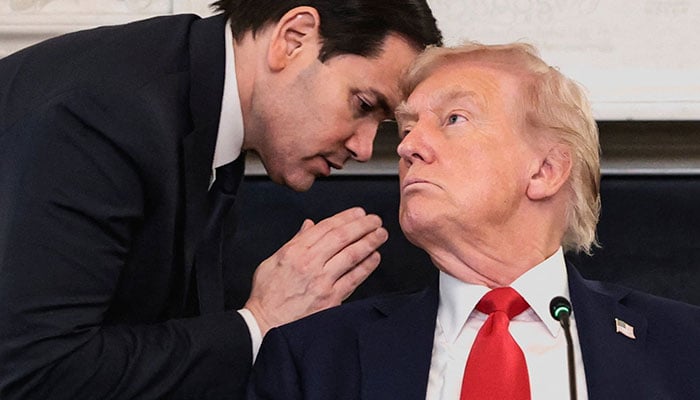
WASHINGTON: It was a typically theatrical moment for the man who loves to publicly boast about being the “peacemaker in chief.”
Donald Trump’s top diplomat interrupted a televised meeting at the White House to hand the US president a note and whisper in his ear that a Gaza deal was imminent.
Shortly afterward he announced the agreement on his Truth Social network. “BLESSED ARE THOSE WHO MAKE PEACE!” public.
But while the climax played out in front of reporters, including AFP journalists in the room, most of Trump’s efforts came behind the scenes, as he sought to pressure a reluctant Benjamin Netanyahu and win over Arab support.
Pressure on Netanyahu
Seeking an unlikely Nobel Peace Prize and eager to bolster his legacy, Trump’s approach has been different from the blank check he was once seen as giving to his key ally Israel.
When Trump hosted Netanyahu at the White House on September 29 to unveil his 20-point peace plan, he publicly came across as fully supporting the Israeli prime minister.
Trump said that if Hamas did not accept the plan, then Israel would have “its full support to finish the job” and destroy the Palestinian militant group.
But privately, Trump was tightening the screws.
First, the plan he presented to Netanyahu and Israeli officials had already been drafted after extensive consultations with Arab and Muslim leaders at the United Nations the previous week.
When Netanyahu confronted him, he discovered there were key areas he had sworn not to accept, especially his refusal to allow a Palestinian state.
Arab unity after the attack on Qatar
Trump was also privately outraged by Israel’s attack on Hamas members in US ally Qatar while negotiations were at a delicate stage. He used Arab unity against the attack to get everyone to agree to the plan.
He then ambushed Netanyahu, forcing him to call Qatar’s leader from the Oval Office to apologize. Trump even sat holding Netanyahu’s phone while the Israeli leader read from a sheet of paper, a photo released by the White House shows.
Politico reported that a senior Qatari official was also in the room during the call to make sure Netanyahu stayed on script. Trump later signed an extraordinary order granting Qatar US security guarantees.
The change also reflected the close ties Trump has fostered with Arab states during his two presidencies.
In his first term, the United Arab Emirates, Bahrain and Morocco signed the Abraham Accords recognizing Israel.
This time, Trump’s first major trip abroad was to the Gulf states: Qatar, Egypt and Abu Dhabi, with no stopover in Israel.
Taking advantage of Hamas’ offer
Trump increased the pressure and gave Hamas a deadline of October 5 to reach a deal or face “all hell.”
Hamas responded shrewdly, taking advantage of Trump’s well-documented promise to secure the release of all hostages held in Gaza. Trump has met repeatedly with family members of the hostages at the White House.
Trump quickly seized on it as a victory.
He issued a video message and, in an unprecedented step for an American president, republished the group’s statement that Washington has designated a terrorist organization.
No mention was made of the fact that Hamas had not fully accepted most of the other points of its plan.
But instead of discussing the details, Trump pressured Israel, Hamas and their mediators to quickly reach an agreement.
Trump told news outlet Axios that he had told Netanyahu: “‘Bibi, this is your chance to win.’ He was fine with that. He has to be fine with that. He has no choice. With me you have to be fine.”



